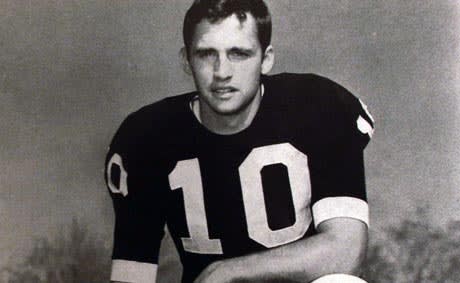Harvard Beats Yale 29-29 may, at its most superficial, seem like a documentary about a football game. The film itself is comprised purely of talking head interviews and broadcast footage of the 1968 Ivy League football championship. This lack of flare and stylistic contrivance puts the focus on the subject and the broader themes that are evoked as the former players recollect the game.
While the title may give away the outcome, director Kevin Rafferty (The Atomic Cafe) manages to generate interest, and even suspense, in a 40-year-old football game that had an extraordinarily bizarre finish. Rafferty collects testimony from virtually every player involved (including Harvards Tommy Lee Jones), each one giving his own play-by-play account of the game. Even more interesting is when the players contextualize the game in terms of the Vietnam War, sexual politics, cultural divides and how all these facets of the 60s were distilled into their academic settings.
The film presents many different men (societys elite, working class, protestors, veterans), some friends, some strangers, and each seems to have been changed, in one way or another, by the events of the game. Some describe the game with crystal clarity, as if it had happened only a week before. Others have some details confused. Their frankness illuminates a communal connection to that day, with each player not fully understanding the way in which the events unfolded or the meaning behind them.
For some it represented the highlight of their lives, for others a bitter overture to the unfairness of the real world. The game serves as a benchmark in time, a moment in which everything connected, where life seemed to be normal and absurd all at once. It is an honest, thoughtful film.
(Emerging)While the title may give away the outcome, director Kevin Rafferty (The Atomic Cafe) manages to generate interest, and even suspense, in a 40-year-old football game that had an extraordinarily bizarre finish. Rafferty collects testimony from virtually every player involved (including Harvards Tommy Lee Jones), each one giving his own play-by-play account of the game. Even more interesting is when the players contextualize the game in terms of the Vietnam War, sexual politics, cultural divides and how all these facets of the 60s were distilled into their academic settings.
The film presents many different men (societys elite, working class, protestors, veterans), some friends, some strangers, and each seems to have been changed, in one way or another, by the events of the game. Some describe the game with crystal clarity, as if it had happened only a week before. Others have some details confused. Their frankness illuminates a communal connection to that day, with each player not fully understanding the way in which the events unfolded or the meaning behind them.
For some it represented the highlight of their lives, for others a bitter overture to the unfairness of the real world. The game serves as a benchmark in time, a moment in which everything connected, where life seemed to be normal and absurd all at once. It is an honest, thoughtful film.
